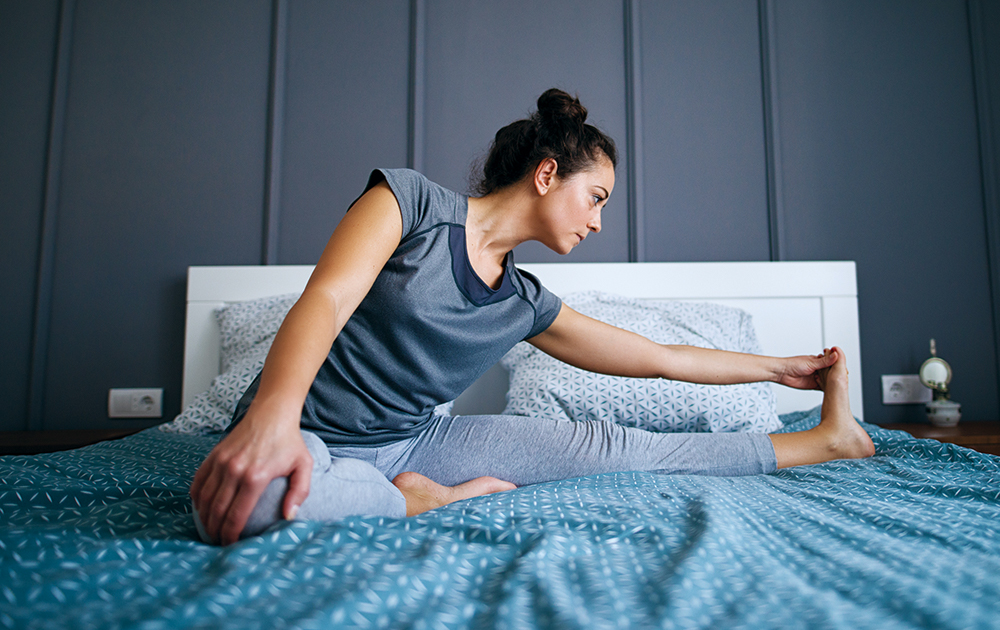
If you are not getting a good night’s rest, you aren’t alone. Did you know that 1 of every 3 Canadian adults between the ages of 35-65 are not getting enough sleep? And that doesn’t take into consideration the quality of our sleep. When it comes to sleep quality:
- 1 in 2 adults have trouble going to sleep or staying asleep.
- 1 in 5 adults do not find their sleep refreshing.
- 1 in 3 adults have difficulty staying awake during waking hours.
Why do we need the recommended 8 hours of sleep?
These days, not getting enough sleep is normal. But just because it’s prevalent – doesn’t mean it’s a norm we should be comfortable with. In fact, insufficient sleep can affect our health for the worse. Here are just some of the health issues that lack of sleep are associated with:
- Obesity
- Type 2 Diabetes
- Cardiovascular disease
- Injuries
- Depression
- Irritability
- Reduced well-being
Winter in a pandemic may be the perfect time to focus on getting into a new routine and improving our sleep hygiene. Here are 6 Sleep Tips to get better sleep:
-
Routines Work
If you never gave up the late-night hours of your youth but did acquire a full-time job in adulthood, it’s probably time to switch up your routine. By consistently going to bed and waking up at the same time you will be able to train your body to expect 8 hours sleep and to get into the rhythm of preparing for downtime.
-
Forget the midnight snack
We know that caffeine keeps us awake – if you’re not getting a good night’s sleep you probably rely on coffee to keep you going the day after. Caffeine can affect some people up to 10-12 hours after consumption. It’s good to remember that caffeine can be in tea, chocolate, and soda, so they aren’t great choices to eat or drink in the evening. Other foods that keep us awake? Spicy and acidic foods can cause heartburn. Which can interrupt our sleep. Also, heartburn is often worsened by laying down!
-
Create a calm sleep environment
Do you sleep better on vacation? That could be the result of being away from your day-to-day responsibilities. Or maybe it’s because sleep spaces in hotels, spas, cottages are ideal environments to catch some zzzz’s. Bedding is fresh, mattresses are sprung, and clutter is at a minimum. Take a long look at your bedroom – are your pillows ancient? Hotels are designed to reduce visual and audible disturbances. Take a cue from them and invest in black-out curtains and a white-noise machine or earplugs, to reduce nightly interruptions.
-
Put down the phone
The blue light emitted by our beloved screens contributes to sleep problems. The light of a blue wavelength can trick your brain into thinking it’s daytime and interrupt our wake-sleep cycles. When the blue light hits your eyes, it stimulates your internal clock. So, in the late evening it’s a smart idea to shut down your computer and hide your smartphones (devices that emit a lot of blue light). When you reduce the blue light, your body gets the signal to start producing melatonin – which tells your body to get some sleep.
-
Increase exercise
Reaching your fitness goals has a lot of benefits! Exercise can reduce anxiety and improve brain health, decreases your chance of chronic illness, and strengthens your bones and muscles. But physical exercise also improves the duration and quality of your night’s sleep. Good news! You don’t need to start the training program of an Olympian to reap the rewards in the sack. Just 30 minutes of moderate exercise can improve your sleep tonight! Exercise may make you a better sleeper – immediately.
-
Try to Stress Less
Insomnia is one of the most common symptoms of stress. Stress can be reduced by maintaining a healthy diet and regular exercise. But investigating the cause of your stress is also important. Do you have physical pain, too much work to do or too little social connection? Assessing the source of your stress will allow you to plan to tackle it. You may need to delegate responsibilities, schedule some virtual time with friends, or buy a new chair to ease the aching in your back.
Getting a good night’s sleep can improve our emotional, physical, and mental well-being. Feeling stressed? Visit Ready for Life to learn more about youth and adult mental health with contributions for leading mental health experts.
All articles and other information posted on http://teacherslife.com are intended to be informational only and not for the purpose of providing any health, medical, financial, insurance, legal, accounting, tax or other advice. Teachers Life does not guarantee or represent that any information in these articles or elsewhere on this website is accurate, complete, current or suitable for any particular purpose. You use or rely on such information solely at your own risk. All articles and website content are the property of Teachers Life and all rights are reserved. IN NO EVENT WILL TEACHERS LIFE BE LIABLE FOR ANY LOSS OR DAMAGE YOU INCUR RELATED TO YOUR USE OR RELIANCE OF THE INFORMATION IN THESE ARTICLES OR ELSEWHERE ON THE WEBSITE. See the Terms of Use for more information.
